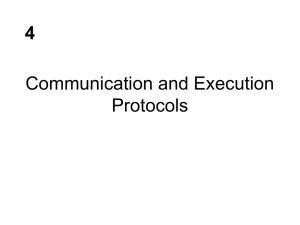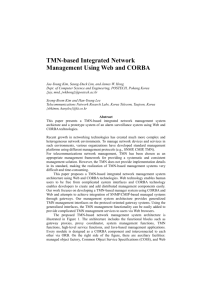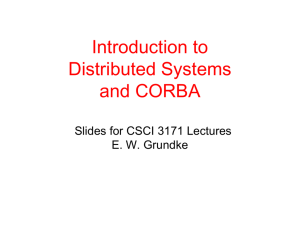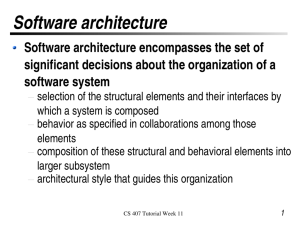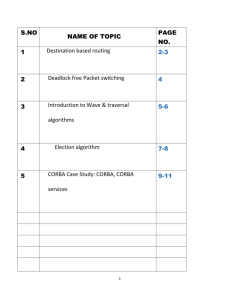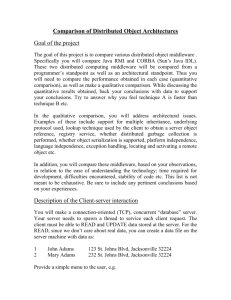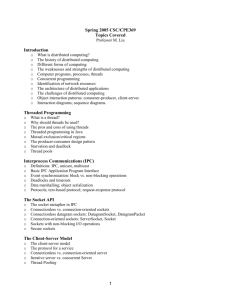Implementing Distributed Controlled Objects with CORBA
advertisement
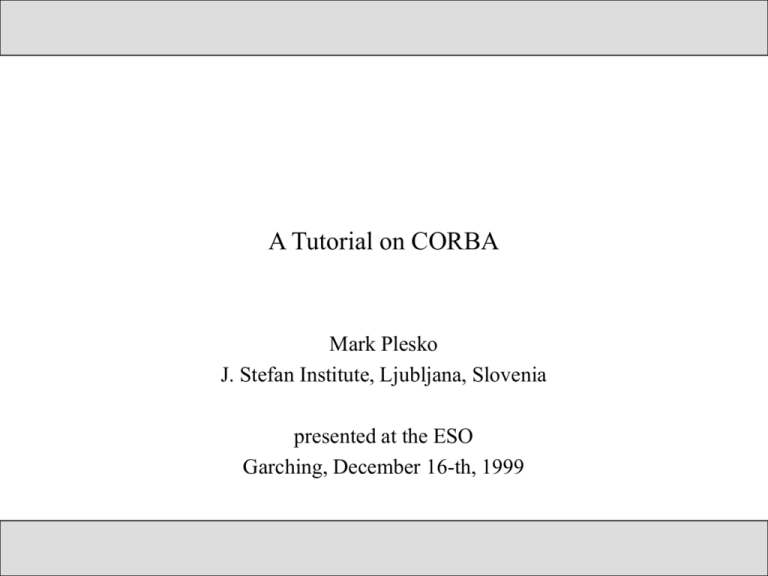
A Tutorial on CORBA
Mark Plesko
J. Stefan Institute, Ljubljana, Slovenia
presented at the ESO
Garching, December 16-th, 1999
M. Plesko, CORBA Tutorial
Summary
• Introduction
–
–
–
–
Justification and History (=blah, blah)
What is CORBA (Executive summary)
How does CORBA work (Programmer summary)
CORBA Features
• Concepts of CORBA
– What are Objects in CORBA
– Data Flow in CORBA
– Definitions
• CORBA details
– Request Invocation
– Object References
– The Portable Object Adapter (POA)
• More About CORBA
ESO, December, 16-th,
1999
2
M. Plesko, CORBA Tutorial
Justification and History (=blah, blah)
• Distributed Applications are heterogeneous
– layers, applications, libraries glued together
– can all components really work together?
• Two key rules
– build platform-independent models and abstraction
– hide as much low-level complexity without sacrificing too much
performance
• CORBA provides a well thought balanced set of abstractions and
concrete services
– Object Services
– Domain Interfaces
– Application Interfaces
• Object Management Group (OMG) since 1989 - now over 800
members
ESO, December, 16-th,
1999
3
M. Plesko, CORBA Tutorial
What is CORBA (Executive summary)
• ORB: Object Request Broker = manages remote access to objects
• CORBA: Common ORB Architecture = software bus for distributed
objects
• CORBA provides a framework for distributed OO programming
– remote objects are (nearly) transparently accessible from the local
program
– uses the client-server paradigm
– platform and language independent
• “an OO version of RPC”
– but a framework rather than a technology => lot of theory
ESO, December, 16-th,
1999
4
M. Plesko, CORBA Tutorial
How does CORBA work (Programmer summary)
Interface PS {
attribute double current;
readonly attribute Ulong status;
octet on(in octet value);
void test(out long result) ;
}
try {
PS aPS = PSHelper.bind(ORB,“PS1”);
if ( ! aPS.on(1) ) return;
aPS.set_current(3.1415);
print (aPS.status());
} catch (CORBAexception) {…}
ESO, December, 16-th,
1999
class PSimp extends PSImplBase{…};
…
PS thisPS = new PSimp(“PS1”) ;
BOA.obj_is_ready(thisPS);
BOA.impl_is_ready();
5
M. Plesko, CORBA Tutorial
CORBA Features
• Don’t worry about unique terminology - these are just words!
– CORBA object
– request, target object, object reference
– client, server, servant
• Features
– Interface Definition Language (IDL)
– language mapping
• official: C, C++, Samlltalk, COBOL, Ada, Java
• also: Eiffel, Modula 3, Perl, Tcl, Objective-C, Python
– Operation invocation and dispatch facilities
• static (known at compile-time)
• dynamic (determined at run-time)
– Object adapters
• Design pattern: adapt CORBA object interface to servant
– Inter-ORB Protocol
ESO, December, 16-th,
1999
6
M. Plesko, CORBA Tutorial
What are Objects in CORBA
• Objects are abstract: not realized by any particular technology
– An object system is a collection of objects that isolates the requestor of
services (clients) from the providers of services by a well-defined
encapsulating interface
• Objects “talk” through requests: operation, target object, zero or
more parameters, optional request context
• Objects are described with interfaces
– operations (methods)
– attributes (properties)
– Standard data types are supported
• object references
• Any
ESO, December, 16-th,
1999
7
M. Plesko, CORBA Tutorial
Data Flow in CORBA
IIOP
ESO, December, 16-th,
1999
8
M. Plesko, CORBA Tutorial
Some Definitions
• ORB:
– find the object implementation for the request, prepare the object
implementation to receive the request and communicate the data
making up the request.
– ORB throws exceptions
– ORB implementation is not defined in CORBA
• Object Adapter (POA, BOA, …)
– provides ORB services to particular groups of object implementations
– generation and interpretation of object references, method invocation,
security of interactions, object and implementation activation and
deactivation, mapping object references to implementations, and
registration of implementations.
• IIOP: Internet Inter-ORB Protocol
– ORB’s of different vendors can talk
– TCP/IP implementation of GIOP
ESO, December, 16-th,
1999
9
M. Plesko, CORBA Tutorial
More Definitions
• IDL: Interface Definition Language
– IDL is the means by which a particular object implementation tells its
potential clients what operations are available and how they should be
invoked.
• Language mapping: recipe how to generate stubs&skeletons from
IDL
– Clients see objects and ORB interfaces through the perspective of a
language mapping, bringing the object right up to the programmer’s
level.
• Interface Repository: where all interfaces are stored network-wide
– provides information on interfaces at run-time
• DII: Dynamic Invocation Interface
– construct a remote method call at run-time without the use of stubs
ESO, December, 16-th,
1999
10
M. Plesko, CORBA Tutorial
Request Invocation
This is transparently handled by the ORB
• Locate target object
• activate server application if not yet running
• transmit any arguments
• activate a servant if necessary
• wait for request to complete
• return any out/inout parameters and return value
• return exception if call fails
ESO, December, 16-th,
1999
11
M. Plesko, CORBA Tutorial
Object References
•
•
•
•
•
Several references to one object
Can point to nowhere (death undetected)
Are strongly typed (at compile&run time)
Support late binding
Implemented by proxies
• But how do you get a reference?
– Bootstrap
• via well known entry point (Naming service)
• via reference-to-string (known URL, filename)
– from a Object method call
ESO, December, 16-th,
1999
12
M. Plesko, CORBA Tutorial
The Portable Object Adapter (POA)
• Provides object creation, servant registration and mapping, request
dispatching
• Intended for scalable, high-performance applications
•
– different POAs for 1 object or millions of objects
Is a locally-constrained object, multiple may exist
• Policies
–
–
–
–
–
–
–
Object life span: persistent/transient
Object Id: system_ID/user_ID
Mapping objects to servants: unique_ID/multiple_ID
Object activation: implicit/no_implicit
Matching requests to servants: object_map/default_servant/manager
Object to servant association: retain/non_retain
allocation of threads: ORB_control/single_thread
ESO, December, 16-th,
1999
13
M. Plesko, CORBA Tutorial
CORBA Services
• Some 20+ defined services
• check vendor for implementation and limitations !
• Some interesting services
– Naming Service
• “directory-based”
• single or federated
– Event Service
•
•
•
•
•
decouples suppliers from consumers
push or pull models
uses Any for event data
Notification Service ?
Messaging Service ?
ESO, December, 16-th,
1999
14
M. Plesko, CORBA Tutorial
More About CORBA
• Other features of CORBA
– vendor specific implementations - check performance you need !
– Gateways to DCOM and OLE automation exist
– CORBA Components (futureware)
• Some buzzwords to know (and use)
– thin client
– three tier architecture
– legacy systems
• Alternatives to CORBA:
–
–
–
–
sockets
RPC
RMI
DCOM
ESO, December, 16-th,
1999
low level, used by CORBA
not OO
language dependent
maybe someday
15
M. Plesko, CORBA Tutorial
Meta IDL - MIDL
#parameter P<type>|<type>{
#accessors{#sync, #async, #history};
#monitorable;
#static{default_value, graph_min, graph_max, min_step,
resolution|pattern, description|string, format|string, units|string};
};
#parameter RW<type>|<type>: P<<type>>{
#eventable{Alarm<<type>>};
#mutators{#sync, #async, #nonblocking, #step};
#static{min_value, max_value};
};
#device PowerSupply{
#actions{on, off, reset, start_ramp(in CBRamp cb, in RampData data)};
#methods{double sync_method_test(in double input, out double output);};
#parameters{current|RW<double>, readback|RO<double>, status|ROpattern};
#static{model|PowerSupplyModel};
};
ESO, December, 16-th,
1999
16
M. Plesko, CORBA Tutorial
Callbacks in BACI: device.property.get(CB)
• Asynchronous completion notification
interface CB<type> : CB {
oneway void execute(in <type> value, in Completion c, in CBDescOut desc);
oneway void cb_done(in <type> value, in Completion c, in CBDescOut desc);
};
• monitoring
• events
interface CB<event_set_name> : CB {
oneway void <event_1_name>(..., in CBDescOut desc);
oneway void <event_2_name>(..., in CBDescOut desc);
...
}
...
void subscribe_<event_set_name>(in CB<event_set_name> cb, in CBDescIn desc);
void unsubscribe_<event_set_name>(in CB<event_set_name> cb);
ESO, December, 16-th,
1999
17
M. Plesko, CORBA Tutorial
CoCoS Development
DB
ODBC LIB
CLIENT STUB
DB ACCESS
CORBA WRAPPER
DB Gen
DB Pop
IDL2CPP
CS LIB
CW Gen
IDL2CPP
MIDL
(BACI)
D
A
G
COB SERVER SKELETONS
CW Gen
CORBA WRAPPER
CSIGen
SERVER IMPLEMENTATION
DEVICE DRIVER
IDL
(MACI)
COSCO
IDL2CPP
ACTIVATOR
CWM
CSM LIB
ESO, December, 16-th,
1999
18
M. Plesko, CORBA Tutorial
CoCoS Runtime
Servant B
Servant A
DB
COB SERVER
COB
ADMIN.
M LINK
(CORBA)
COB
MANAGER
COB
COB
COB
COB
type B
COB
type A
CLIENT
ESO, December, 16-th,
1999
19
M. Plesko, CORBA Tutorial
CoCoS Startup and Management
ESO, December, 16-th,
1999
20
M. Plesko, CORBA Tutorial
CoCoS on Pharlap/TNT Real-Time Operating System
ESO, December, 16-th,
1999
21

